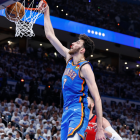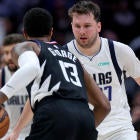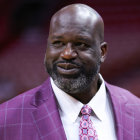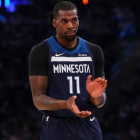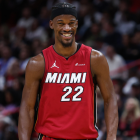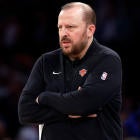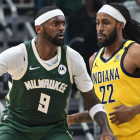The Toronto Raptors have been building around All-Star guards Kyle Lowry and DeMar DeRozan for years, creating a culture that is admired around the league. They reached the Eastern Conference finals for the first time in franchise history last year, and took two games from the eventual-champion Cleveland Cavaliers. After a strong start this season, though, it became clear that something was missing. Toronto is 17th in defensive rating this season, thanks in part to the departure of Bismack Biyombo last summer, and its offense has fallen off a cliff in the last four weeks. The Raptors have lost 10 of their last 14 games, leading DeRozan to acknowledge that some "help" before the deadline would be good and Lowry to say that something has to change.
Enter Serge Ibaka.
The Raptors have tried to get the floor-spacing, shot-blocking big man before, but they got the deal done on Tuesday. They will send Terrence Ross and the lesser of their two 2017 first-round picks to the Orlando Magic in exchange for the man who will be expected to solidify their core. This move does not come without risk -- Orlando has been better on defense with Ibaka on the bench, and he could walk in free agency in the offseason -- but it has an enormous amount of upside. In theory, at least, Ibaka is exactly what Toronto needs.
The single biggest reason for the Raptors' recent slide is that they haven't really had a power forward lately. A nagging knee injury has meant that Patrick Patterson has played in just nine games since the new year, including the Feb. 3 game in Orlando where he could only handle seven minutes. In his absence, coach Dwane Casey has had to start Pascal Siakam, Lucas Nogueira and Jakob Poeltl next to Jonas Valanciunas in the frontcourt. Two of them are rookies and two of them are centers. The results have been disastrous.
Presumably, Ibaka will now start next to Valanciunas at power forward and then back him up as a center. His 3-point shooting is an essential skill on this roster because of the fact that DeRozan doesn't space the floor and their offense is largely based on guards getting into the paint and making plays. Ibaka will immediately be Toronto's best pick-and-pop threat since Chris Bosh and its best screener since Amir Johnson. When Patterson is healthy, Casey will be able to play lineups with proper spacing for a full 48 minutes. In the modern NBA, this is becoming close to a necessity.
While Ibaka will help the offense, that's not the major reason for this trade. Casey is a defense-first coach, and his team has let him down on that end all year. The most important part of Ibaka's job description will be protecting the rim, containing pick-and-rolls and defensive communication. The Raptors will ask him to switch onto smaller players and recover to shooters the way he did last May for the Oklahoma City Thunder in the Western Conference finals. They hope that he'll be doing that in the Eastern Conference finals against the Cavaliers.
Consider this 5-man unit: Lowry, DeRozan, DeMarre Carroll, Patterson and Ibaka. Throw Cory Joseph or Norman Powell in Carroll's place if you'd prefer. This is a lineup built for 2017: smart, athletic, versatile and able to defend the paint. It will also likely be how Casey chooses to finish most games.
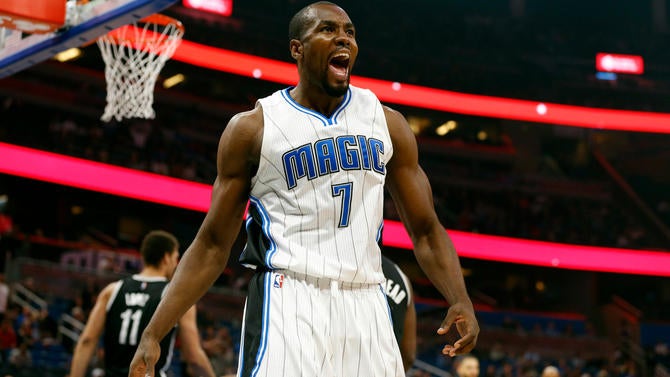
For Raptors president Masai Ujiri, this is the biggest acquisition of his tenure. When he arrived in the summer of 2013, he inherited Lowry, DeRozan and Valanciunas. All three of them have re-signed or extended their contracts -- no small thing! -- but Ujiri has chosen to tinker with the composition of the supporting cast rather than drastically changing the core. This is a break with that trend: Ujiri is making a big bet on Ibaka, as the plan is clearly to re-sign the big man (and Lowry) long-term in July.
There are other ramifications here. Ibaka's presence naturally makes Valanciunas more expendable in trade talks. Patterson will be a free agent in a few months, too, and Toronto has outscored opponents by 13.6 points per 100 possessions when he's on the court this year. The smart money is on the team keeping two of these frontcourt players, not three.
Quietly, the Raptors have also shown a commitment to Powell. With Ross gone, Powell will no longer be on the fringe of the rotation; rather, he will be an integral part of it. Powell is a fan favorite who earned playing time in the postseason as a rookie picked No. 46 in the draft. He has developed more this season, showing an ability to get to the basket at will. Opponents don't respect his 3-point shooting as much as they do Ross', but he has made 37.5 percent of his career 3s and can defend three positions. Toronto needed to find more minutes for him.
Essentially, Ujiri did what everybody wanted him to do. Drafting Powell, a steal, allowed him to trade Ross. He sacrificed a future pick in order to balance the roster, strengthen the defense and make the stars' jobs easier. And he did all this while maintaining flexibility -- as well as Valanciunas being a potential trade chip, Ujiri didn't have to trade recent first-round picks Delon Wright or Jakob Poeltl.
If this was the offseason, there would be time for everybody to praise Ujiri and celebrate what great things this roster could do. Right now, there won't be much of that -- there is real pressure on the Raptors to integrate Ibaka quickly. They're tied for fourth in the East with the Atlanta Hawks, and they need Lowry to end the season confident that this is the best place for him. Anything short of making the conference finals again will be seen as a disappointment.















